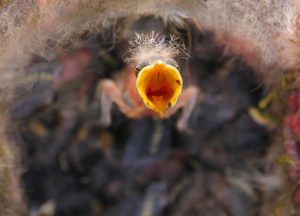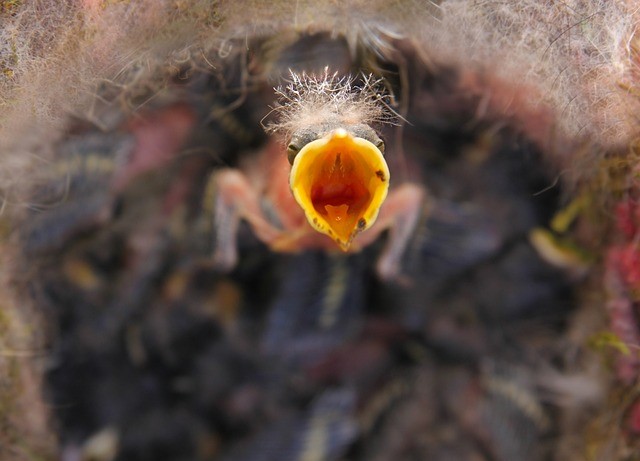BABY COCKATIELS
Baby cockatiels present an exciting time among your brood. Make sure the parents have all the nutrient rich food they need so they can feed their babies properly. However, you must be prepared to help if a baby is rejected or not getting enough food from the parents.
Caring for Baby Cockatiels 
First few days
Baby cockatiels are born with no feathers and their eyes closed. Try not to touch the babies for the first day or so as it’s important that the parents keep the baby close and warm. Within a couple of days the chick should start to develop fluff and will try to start standing. You must see if the crop is functioning. Is it being filled and emptied? This is important to prevent bacteria or fungal infections from spoilt food build up. They will grow quickly – doubling their size every couple of days.
At around ten days old they start to open their eyes. They will still look like bald “Martians” but wings, legs, feet and claws are distinguishable. Mom and dad will still be feeding the babies every few hours.
Two to three weeks old
Your baby cockatiels should be starting to stand more confidently. Wings should be well formed and colored feathers showing through the fluff. Their eyes should be open and bright. They are starting to develop their own personality.
Four to Six weeks old
The adventure is starting! The baby cockatiels will be getting stronger and bigger. They should be flapping their wings regularly and by six weeks may have even taken their first flight. They will still be fed by their parents but should also be cracking seeds and learning to forage. The babies will be happy to leave the nesting box but stay inside the cage. Feathers should be well formed but may not have complete coverage.
Handling your Baby Cockatiels
It is important that you start handling your baby cockatiels early. From 5-7 days old you should be touching the birds or picking them up. Keep it quick to start with. Once they are a few weeks old you can hold them longer.
Holding the birds helps tame them and they will not fear humans.
When their legs are strong enough you can “tunnel” the birds. Hold the bird in your hand against your breast plate (sternum). As the bird walks up put your other hand over the top of the bird again. This pats the bird along his full length and he has to “tunnel” through your hands. This can be a game and helps you both bond through touch.
Feeding your baby cockatiels
Feeding your baby cockatiels the same nutrient rich foods the parents eat will ensure your bird grows strong and healthy. Introduce new foods one at a time and keep them the same for a few days so the babies will get use to them. Always have plenty of water available.
Clean the nesting box thoroughly with warm soapy water and leave out in the sun to dry once all birds have flown out. Keep the nest and cage area very clean while the birds are very young to avoid infections and diseases.
Your baby cockatiels should be ready for sale from around 7-8 weeks old. I try and wait until 8 weeks just to make sure they are thriving and have the best chance with their relocation.
All in all, caring for baby cockatiels is a very exciting time. Life truly is amazing. These tiny creatures go on to become cheeky little, adventure packed companions. They do make great pets. Good luck and enjoy!

